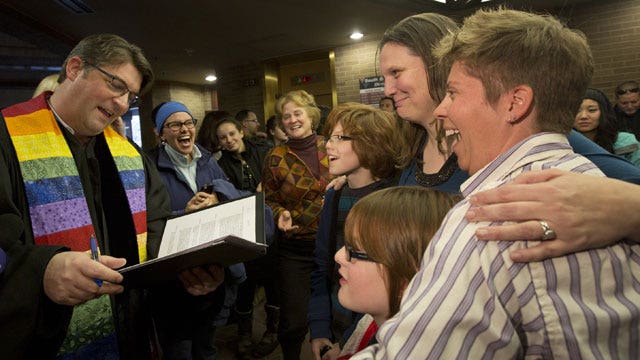A federal judge on Monday blocked a request by Utah officials to halt same-sex weddings, allowing gay marriage to continue in the conservative state following a surprise court decision last week.
Judge Robert J. Shelby, who blocked the request on Monday, overturned Utah's ban on same-sex marriage this past Friday. In a decision Utah officials claim has caused chaos in the state, he ruled the voter-approved measure is a violation of gay couples' constitutional rights.
The decision sent couples flocking to county clerk offices for marriage licenses. About 125 gay couples obtained marriage licenses Friday in Salt Lake City, and Clerk Sherrie Swensen said her office issued a similar number Monday morning. An estimated 100 licenses were issued in other counties, while some county clerks shut their doors as they awaited Shelby's decision.
The state has tried to shut the license process down, and lawyers said they would now ask a higher court to put gay marriage on hold.
"I want all Utahns to understand I am committed to advancing this issue through the judicial system as we work toward a clear and understandable resolution," Republican Gov. Gary R. Herbert said in a statement. "I recognize that this is a highly emotional issue with people of goodwill on both sides of the debate. I encourage everyone to remain respectful of one another and of the legal process."
Brian Brown, president of the National Organization for Marriage, urged the 10th Circuit Court of Appeals to stay the decision.
"It is patently wrong and unjust that the people of Utah should lose their right to define marriage because of the ruling of a single Obama appointee to the federal bench," Brown said in a statement. "This decision provokes a constitutional crisis."
Shelby's decision last week has drawn national attention given Utah's reputation as one of the most conservative states in the country. It is also the location for the Mormon church. The gay weddings in Salt Lake City have been taking place about 3 miles from church headquarters.
For now, Utah has joined the likes of California and New York to become the 18th state where same-sex couples can legally wed.
Many Utah residents belong to The Church of Jesus Christ of Latter-day Saints, and Mormons dominate the state's legal and political circles.
The Mormon church was one of the leading forces behind California's short-lived ban on same-sex marriage, Proposition 8, which voters approved in 2008. The church said Friday it stands by its support for "traditional marriage," and it hopes a higher court validates its belief that marriage is between a man and woman.
In court Monday, Utah lawyer Philip Lott repeated the words "chaotic situation" to describe what has been happening in Utah since clerks started allowing gay weddings. He urged the judge to "take a more orderly approach than the current frenzy."
"Utah should be allowed to follow its Democratically chosen definition of marriage," he said of the 2004 gay marriage ban.
Peggy Tomsic, the lawyer for the same-sex couples who brought the case, called gay marriage the civil rights movement of this generation and said it was the new law of the land in Utah.
"The cloud of confusion that the state talks about is only their minds," she said.
Lawyers for the state waged a legal battle on several fronts as they sought to stop the same-sex weddings.
On Sunday, a federal appeals court rejected the state's emergency request to stay the ruling, saying it couldn't rule on a stay since Shelby had not yet acted on the motion before him. The court quickly rejected a second request from Utah on Monday. The state plans to ask the court a third time to put the process on hold.
Adding to the chaos surrounding the situation is the fact that Utah Attorney General John Swallow stepped down about a month ago amid a scandal involving allegations of bribery and offering businessmen protection in return for favors. The state has had an acting attorney general ever since, and Gov. Gary Herbert appointed a replacement Monday who will serve until a special election next year.
In Shelby's 53-page ruling, he said the constitutional amendment that Utah voters approved violates gay and lesbian couples' rights to due process and equal protection under the 14th Amendment. Shelby said the state failed to show that allowing same-sex marriages would affect opposite-sex marriages in any way.
The decision drew a swift and angry reaction from Herbert, who said he was disappointed in an "activist federal judge attempting to override the will of the people of Utah." The state quickly took steps to appeal the ruling and halt the process, setting up Monday's hearing before Shelby.
The Associated Press contributed to this report.





